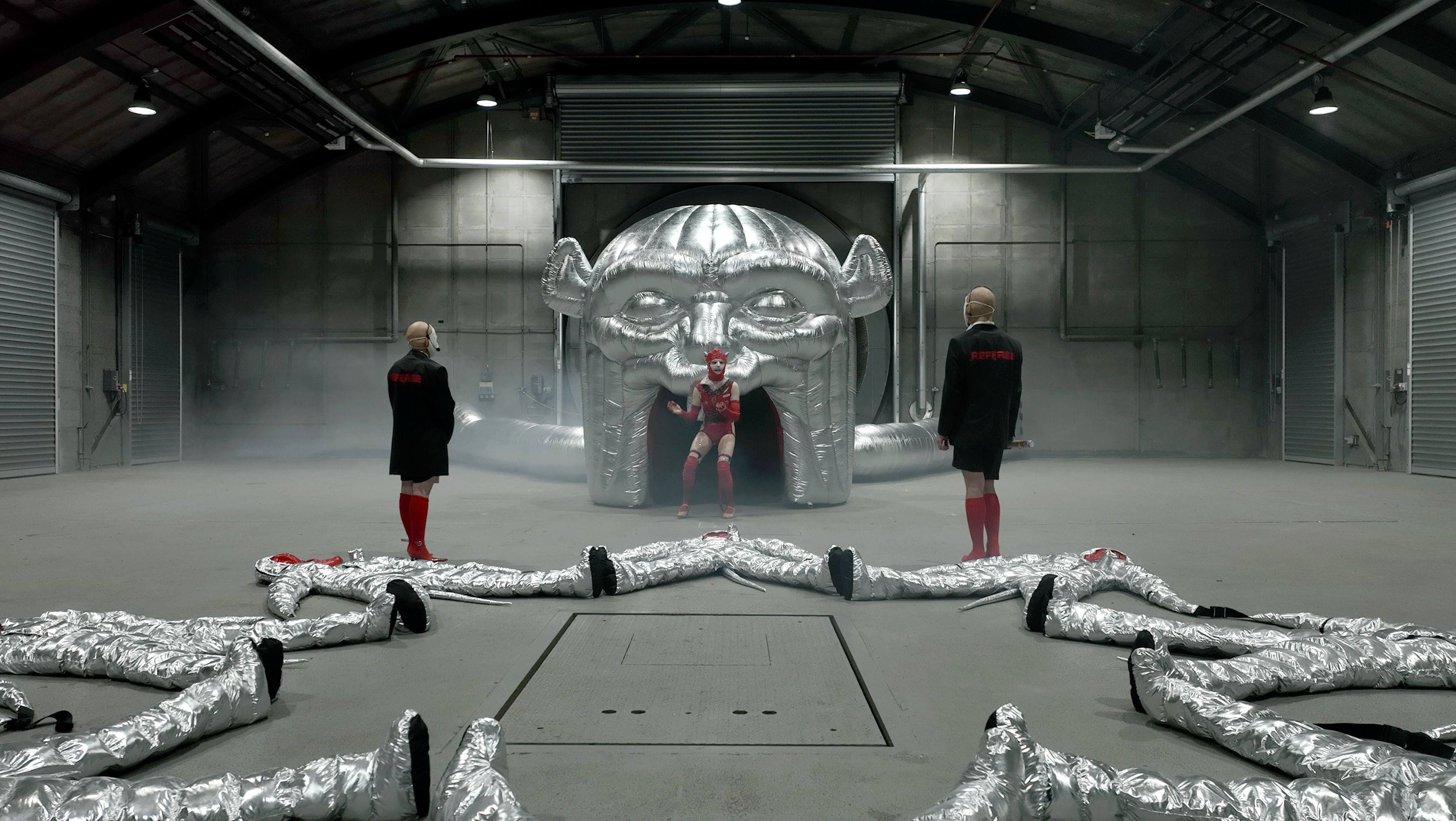1 May 2023 Nothing could have prepared me for Jenkin van Zyl’s extreme visual extravaganza, the nearly fifty-minute film Surrender, 2023. Not the enormous, room-size, rodent-faced, silver inflatable hellmouth at the gallery’s entrance, or the subsequent corridors, filled with a tangle of Lamson pneumatic tubes (an antiquated building-wide tentacular delivery system). Not the four white-sheeted hotel beds, equipped with Soviet-era medicine cabinets, which provided the screening-room’s seating. Van Zyl’s scattergun panoply of interests read like random Google search terms, encompassing not only theatrical jaws of hell and obscure predigital technologies, but also (as we discover in the film) short-stay Japanese sex hotels, performance artist Leigh Bowery, prosthetic latex masks, queer club culture, 1920s–’30s American dance marathons, Matthew Barney, and rat kings. Yet van Zyl somehow orchestrates these and more into the extraordinarily coherent world-building marvel that is Surrender.

Jenkin van Zyl, Surrender, 2023, 4K video, color, sound, 48 minutes 46 seconds.
The premise: One Sunday, a half-rodent humanoid named Grace (principally played by Alex Margo Arden in an inspired performance) checks in for a weeklong stay at a dreary love hotel. There, she encounters seven more hybrid, gender-crossing beings like herself, who together engage in stunning wardrobe changes and incomprehensible rituals, mostly occurring in a central windowless event space reminiscent of the battered auditorium of an underfunded high school. Across countless costume shifts, schizophrenic mood swings, and baffling scenarios—a confetti-strewn, twirling, military-style wedding; impromptu gymnastic routines and endurance dance contests; and a woefully pathetic awards ceremony, all punctuated by brief texts about such enigmas as long-distance lactating—van Zyl’s unknowable world somehow remains seamlessly intact and perfectly exhilarating.
By the time the narrative reached Tuesday, I was already overwhelmed: by the mesmerizing musical score (devised by the artist) that layers ten or more tracks at once and expertly samples BBC sound archives, foxtrots, Karlheinz Stockhausen, dance anthems, ’70s Muzak, Felix Mendelssohn, and vintage love songs such as Brenda Lee’s mournful “I’m Sorry” (1960); by the gang of human/rodent crossbreeds in skintight red Lycra fetish costumes complete with floor-skimming tails and protruding rat ears; by the pair of gender-defying nurses wearing Hannibal Lecter–ish cloth face masks and bare-assed aprons exposing white-lace panties. And things were just warming up. Thursday brought a dramatic crescendo as the troupe slipped into padded silver bodysuits (with swinging tails and bloodred zippered linings) and eventually took to the floor to form a star pattern that, filmed from above, recalled a Busby Berkeley routine. Throughout, psychedelic multicolored lighting and inexplicable recurring images—trophies bearing scary grinning faces, rows of metronomes ticking out of sync—enhance the unnerving, acid-flashback sensations. What could have seemed a weeklong bad LSD trip in a rat-infested motel was instead an enthralling experience, as attested by the throngs of visitors who came to witness van Zyl’s mystifying, irresistible epic.
Multiple images of descent—whether awaiting hotel elevators or hurtling down pneumatic tubes—turn dramatic on Saturday, when Grace crawls down a massive orifice in her bed, landing in a vast underground concrete bunker. The film’s downward spiral could recall Dante’s subterranean rings of hell, except these pleasure-seekers look so glad to be here. This was, literally and metaphorically, a deep dive: into van Zyl’s limitless imagination but also into the inexhaustibility of erotic subcultural fantasy, of sartorial invention, of gender possibility. I thought of Baroque ceilings, ascending endlessly heavenward into dematerialized light. Here is the Baroque’s mirror opposite: infinity as a hellish, materially loaded, claustrophobic drop into the dark bottomless depths of the human psyche, sexual desire, the internet. Wow, I thought. With Surrender, van Zyl may have single-handedly invented a wholly unprecedented, updated view of the infinite.


